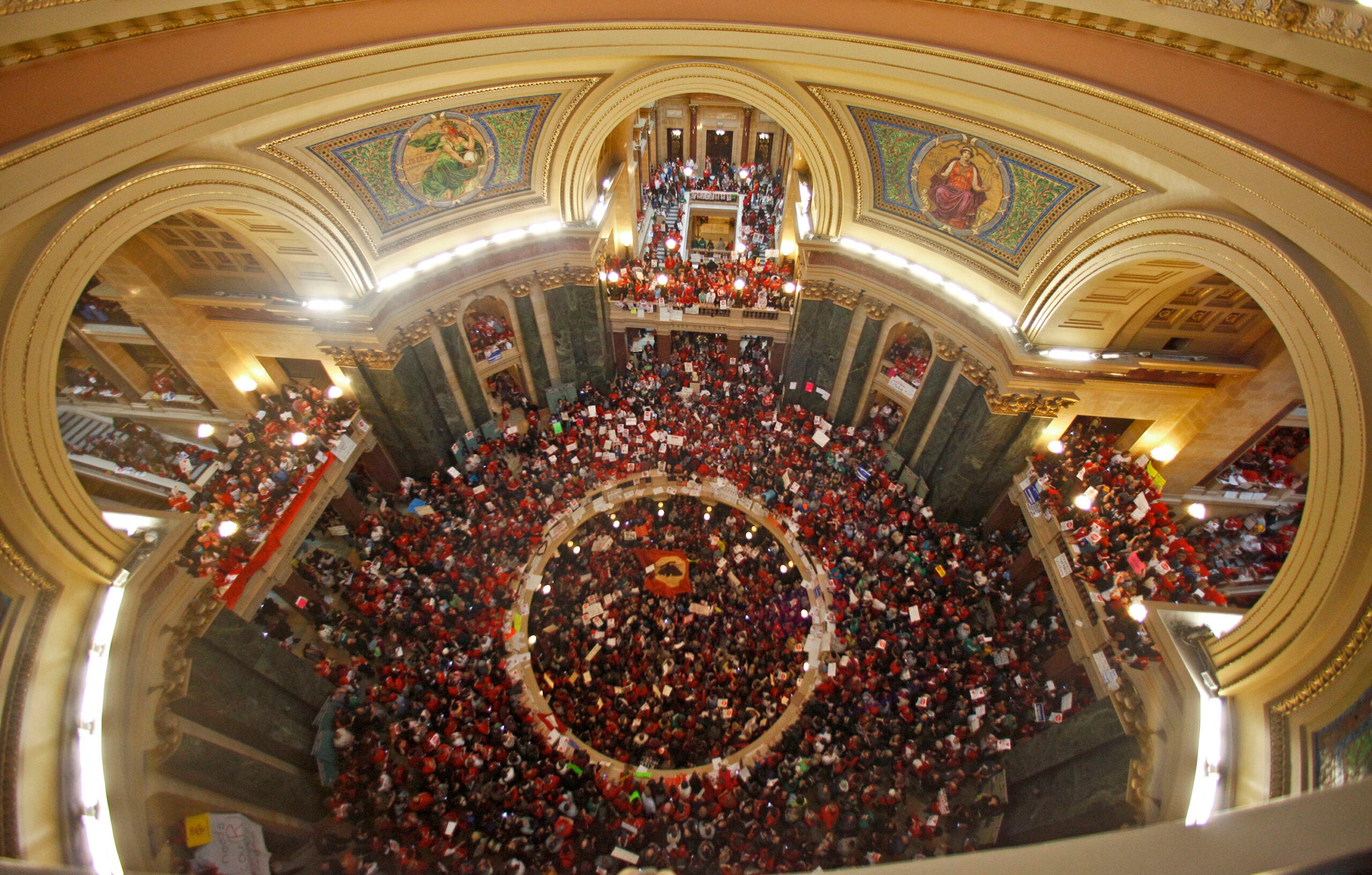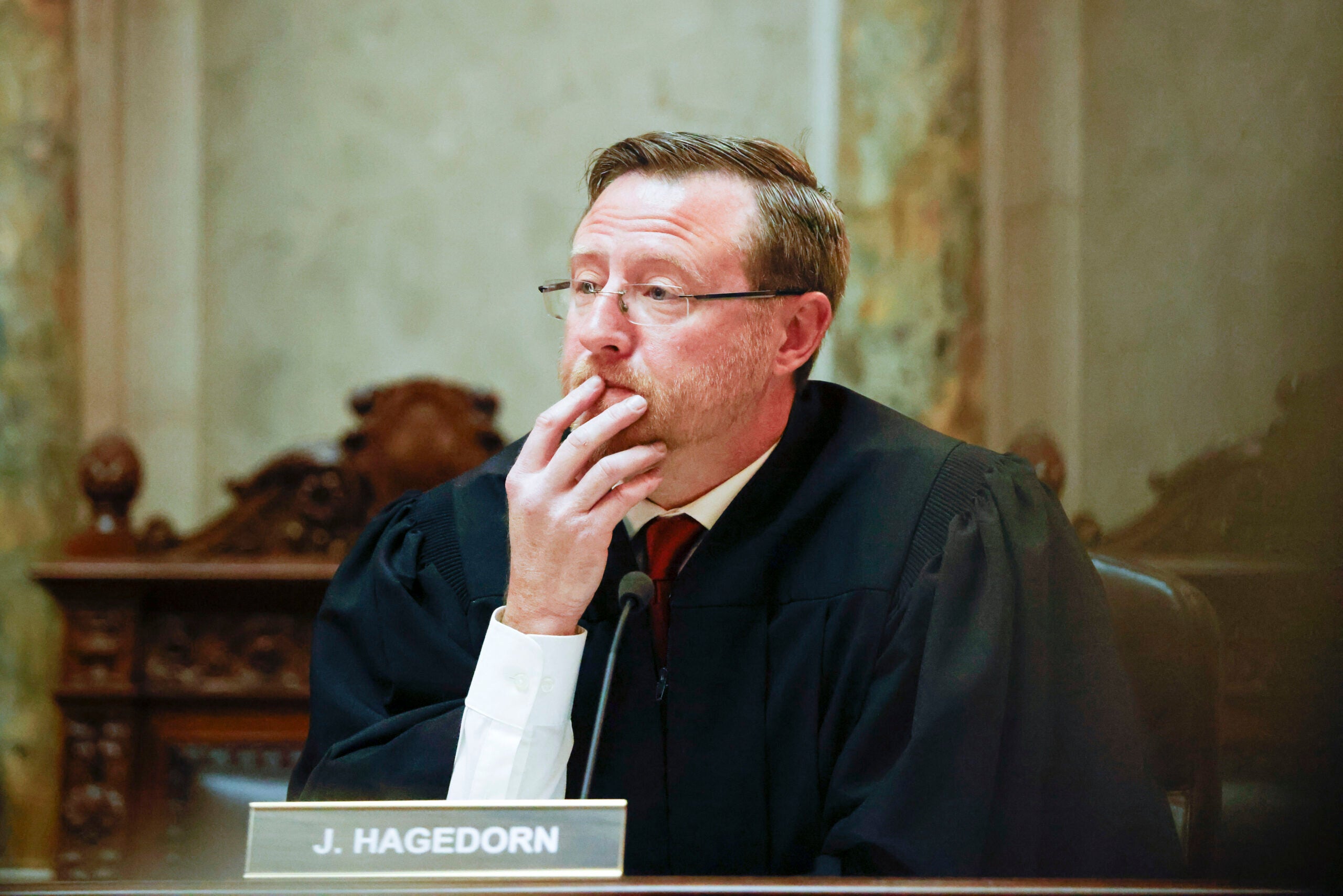Public employee collective bargaining rights have been restored by a Dane County judge, who ruled that several sections of Wisconsin’s controversial law known as Act 10 are unconstitutional.
In a final decision issued Monday, Dane County Circuit Court Judge Jacob Frost struck down several sections of the 2011 law passed by Republican lawmakers and signed by former Gov. Scott Walker.
His decision built on a July ruling, which found the law violated the Wisconsin Constitution’s equal protection clause because it allowed unions representing police, firefighters and other public safety workers to collectively bargain with the state, while it removed those rights from other public employees like teachers.
The lawsuit was filed against the Wisconsin Employment Relations Commission and other state agencies more than a year ago by a group of unions representing public employees affected by Act 10.
In his Monday order, Frost chided Wisconsin’s Republican-controlled state Legislature, which intervened in the case and suggested he should not strike down any Act 10 provisions he found unconstitutional in July.
“In reality, the Legislature argues that the Court can only render an empty judgment declaring parts of Act 10 unconstitutional, but can provide no remedy to stop enforcement of those unconstitutional provisions,” Frost said.
With that, Frost said his judgement is effective against the state immediately and requires agencies not to enforce unconstitutional provisions of the 2011 law.
“If the Legislature wants this Court’s decision to not yet have effect, it must move this Court to stay enforcement of its decision pending appeal,” Frost said. “That has not yet been requested, so I do not address it.”
Unions praise ruling; Republicans vow appeal
A statement from the Wisconsin Education Association Council, the state’s largest teacher’s union, heralded Frost’s ruling as siding with public service workers. It included comments from individual employees named as plaintiffs in the suit, including Ben Gruber, a Wisconsin Department of Natural Resources conservation warden, who said the ruling “is personal for me and my coworkers.”
“As a conservation warden, having full collective bargaining rights means we will again have a voice on the job to improve our workplace and make sure that Wisconsin is a safe place for everyone,” Gruber said. “We realize there may still be a fight ahead of us in the courts, but make no mistake, we’re ready to keep fighting until we all have a seat at the table again.”
A statement from Wisconsin AFL-CIO President Stephanie Bloomingdale noted “over 60 sections of Act 10,” which the union said has “done great harm to working people” in Wisconsin, have been struck down with Frost’s ruling.
“(Act 10) has lowered wages and led to staff shortages and long-term vacancies in key public service positions,” Bloomingdale said. “”Working families in Wisconsin will greatly benefit from the restoration of collective bargaining rights.”
News with a little more humanity
WPR’s “Wisconsin Today” newsletter keeps you connected to the state you love without feeling overwhelmed. No paywall. No agenda. No corporate filter.

Republican leaders of the GOP-controlled Legislature were quick to criticize Frost’s ruling. Assembly Speaker Robin Vos, R-Rochester, issued a statement promising to appeal the case.
“This lawsuit came more than a decade after Act 10 became law and after many courts rejected the same meritless legal challenges,” Vos said. “Act 10 has saved Wisconsin taxpayers more than $16 billion.”
Wisconsin Senate Majority Leader Devin LeMahieu, R-Oostburg, also promised an appeal while criticizing Frost.
“Despite Act 10 being upheld repeatedly by state and federal courts, an activist Dane County judge decided to issue a ruling suddenly deciding Wisconsin’s law is unconstitutional,” LeMahieu said.
Former Gov. Walker took to social media with a video calling Frost’s ruling an example of “brazen political activism.” He claimed it also doubles as “an early Christmas present to the big government union bosses” hoping to dismantle GOP reforms passed during his administration.
“Collective bargaining is not a right, it is an expensive entitlement. And this judge is wrong on all counts, not just on the policy, but on the legal issues as well,” Walker said.
The introduction of Act 10 in 2011 spawned massive protests at the Wisconsin Capitol and several lawsuits aimed at defeating it. In 2014, a federal appeals court upheld the law, stating that the U.S. Constitution doesn’t require the state to maintain policies allowing certain associations to negotiate contracts.
Later that year, a conservative majority on the Wisconsin Supreme Court also upheld the law, stating that public-sector collective bargaining is “a creation of legislative grace and not constitutional obligation.”
Wisconsin Public Radio, © Copyright 2025, Board of Regents of the University of Wisconsin System and Wisconsin Educational Communications Board.






